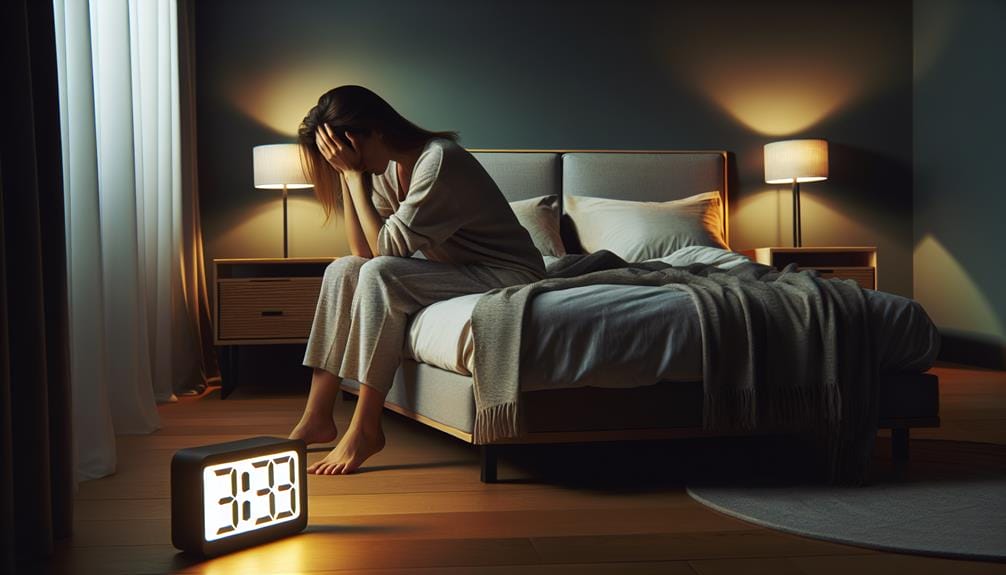Quality sleep is essential for your brain function, mood, and physical health. Adults should aim for 7-8 hours to enhance memory and cognitive performance. A consistent sleep schedule helps regulate your body's internal clock, while a calming bedtime routine enhances rest. Make sure your bedroom is dark, quiet, and cool to create an ideal sleep environment. Avoid caffeine and nicotine close to bedtime and manage stress with relaxing activities. If you notice persistent sleep issues, consult a healthcare professional. Learn more about the benefits of sleep and tips to improve your rest.
Key Takeaways
- Consistent sleep schedules enhance sleep quality and daytime alertness.
- Quality sleep regulates metabolism and prevents chronic conditions like obesity and heart disease.
- Create a calming sleep environment with darkness, quiet, and comfortable bedding.
- Avoid caffeine, alcohol, and heavy meals before bedtime to improve sleep patterns.
- Develop a bedtime routine with relaxing activities to signal the brain it's time to sleep.
Why Sleep Matters
Sleep plays an essential role in maintaining your brain function, memory, and overall cognitive performance. Think of sleep as your brain's personal janitor, sweeping out toxins and repairing the damage from your daily stress.
Quality sleep is also important for your health because it helps regulate your metabolism and keeps your hormones in check. Without it, you're more likely to face chronic conditions like obesity and heart disease. You know those late-night snacks? Blame it on poor sleep messing with your metabolic regulation.
Health Benefits of Sleep

Beyond its role in preventing chronic conditions, getting enough sleep directly contributes to a healthier heart, improved mood, and a stronger immune system.
Imagine waking up refreshed and not feeling like a zombie—good sleep can do that! Healthy sleep enhances mental function, relieves stress, and even boosts your athletic performance (so you can finally beat your friend in that morning run).
Quality sleep is essential for heart health, regulating blood sugar levels, and maintaining a healthy weight. It's like a magical elixir for your overall health.
Recommended Sleep Duration
You need to understand that the amount of sleep required varies by age, with adults needing 7-8 hours each night and newborns requiring much more.
To achieve peak health, it's not just about the hours you sleep but also maintaining consistent sleep patterns and ensuring good sleep quality.
Knowing your specific sleep needs based on your age can help you make informed decisions about your nightly rest.
Age-Based Sleep Needs
Understanding how much sleep is needed at different stages of life is essential for maintaining overall health and well-being.
Newborns, those tiny bundles of joy (and noise), require a whopping 14 to 17 hours of sleep daily for best growth and development.
Toddlers, with their boundless energy, need 11 to 14 hours to support their physical and cognitive development.
Preschoolers benefit from 10 to 13 hours to promote healthy growth and learning abilities.
School-aged kids should aim for 9 to 12 hours to maintain focus and energy levels.
Teenagers, going through the rollercoaster of adolescence, need 8 to 10 hours to support cognitive function and emotional well-being.
Optimal Sleep Cycles
To achieve peak health, adults should aim for 7-8 hours of sleep each night. Think of it as your daily recharge to keep your cognitive function sharp and your mood from going haywire.
Your brain isn't a fan of ideal, so stick to consistent schedules. Your sleep cycles crave routine like you crave coffee on a Monday morning.
Without enough sleep, your body waves a white flag, and you might face learning difficulties that make remembering your own name a challenge. For peak health, don't cut corners on sleep. Trust us, your mind and body will thank you.
Sleep Quality Indicators
The quality of your sleep hinges not just on duration but also on consistency and depth, making those 7-8 nightly hours essential for adults. Think of it this way: a good night's sleep is like a pizza—sure, you need enough slices (hours), but they also need to be evenly cooked and delicious. Lack of sleep and sleep disorders can mess with your sleep quality. Insufficient sleep isn't just a bummer; it can lead to serious health issues. Here's a quick reference for recommended sleep durations:
| Age Group | Recommended Sleep Duration |
|---|---|
| Newborns | 14-17 hours |
| Infants | 12-16 hours |
| School-aged children | 9-12 hours |
| Teenagers | 8-10 hours |
| Adults | 7-8 hours |
Sleep and Cognitive Function

Getting enough sleep is critical for maintaining and enhancing your cognitive function. When you sleep, your brain doesn't just take a nap; it's busy processing memories, consolidating learning, and clearing out toxins.
Think of it like a nightly brain detox party. Without sufficient sleep, your cognitive abilities can take a nosedive, making it harder to focus, learn new information, and make decisions.
Quality sleep is your brain's best friend, ensuring memory consolidation and peak brain function. Plus, a well-rested brain means you're more alert, creative, and ready to tackle any problem like a superhero.
Risks of Sleep Deprivation
When you don't get enough sleep, you're putting yourself at risk for cognitive impairment, which can affect your memory and decision-making abilities.
Lack of sleep also weakens your immune system, making you more susceptible to illnesses.
Additionally, sleep deprivation can lead to mood disorders, such as anxiety and depression, impacting your overall well-being.
Cognitive Impairment Risks
Chronic sleep deprivation impairs cognitive functions, severely affecting your memory, concentration, and decision-making abilities. Imagine trying to navigate life with a GPS that's constantly “recalculating.” Your brain needs sleep to process information and make sense of the world. Without it, you're more prone to neurodegenerative diseases like Alzheimer's.
Here's a quick rundown of what sleep deprivation can do:
- Memory Woes: Forgetting why you walked into a room? It's not just age; lack of sleep can mess with your recall.
- Concentration Chaos: Good luck focusing when your brain's on a coffee break.
- Decision-Making Disasters: Ever made a questionable choice at 3 AM? Blame sleep deprivation.
Weakened Immune System
Lack of sleep weakens your immune system, making you more vulnerable to infections and illnesses. Think of your immune system as a superhero squad—without adequate sleep, they're stuck in slow motion.
Chronic sleep deprivation reduces the production of immune cells and antibodies, leaving your body defenseless against pathogens. Plus, it ramps up inflammation, which only makes things worse.
So, if you want to avoid playing host to every cold and flu virus out there, prioritize your zzz's. Adequate sleep is your secret weapon, boosting immune function and helping you fend off those pesky invaders.
Keep it consistent, and you'll recover faster from any illnesses that do manage to sneak past your defenses.
Mood Disorders Impact
Sleep deprivation directly increases the risk of developing mood disorders like depression and anxiety. When you're running on fumes, your emotional regulation takes a nosedive, making it harder to keep your cool.
Elevated stress levels can turn minor annoyances into full-blown catastrophes. Plus, your brain's ability to make rational decisions goes out the window.
Here are three ways sleep deprivation messes with your mood:
- Emotional Rollercoaster: Lack of sleep makes you more prone to mood swings, turning you into a drama queen.
- Stress Overload: Missing out on sleep cranks up your stress levels, making you feel like you're constantly living in a pressure cooker.
- Poor Decision-Making: Sleep deprivation impairs your judgment, ensuring you make choices you'll regret later.
Creating a Sleep Schedule

Establishing a consistent sleep schedule can greatly enhance your overall sleep quality and daytime alertness. Think of your internal clock as a stubborn old cat—it likes routine.
By sticking to a regular sleep schedule, you'll help regulate your sleep-wake cycles. Your body will start to recognize when it's time to sleep and wake up, making mornings less of a groggy fight.
Kicking off with a solid bedtime routine can signal your brain that it's time to wind down. Plus, maintaining this rhythm even on weekends can keep you feeling refreshed and alert.
Bedtime Routine Tips

Creating a consistent sleep schedule is just the beginning; now let's talk about bedtime routine tips that can further enhance your sleep quality.
First, develop a consistent bedtime routine that signals your body it's time to wind down. Engage in relaxing activities like reading a book, taking a warm bath, or practicing deep breathing. Avoid stimulating activities such as watching TV or scrolling through your phone. Stick to this routine even on weekends to keep your sleep-wake cycle in check.
A calming sleep environment also plays a key role. Here are some bedtime routine tips:
- Read a book: A page-turner, not a thriller!
- Take a warm bath: Think spa, not splash zone.
- Practice deep breathing: Inhale, exhale, repeat.
Optimizing Your Sleep Environment

Transform your bedroom into a sleep sanctuary by ensuring it's dark, quiet, and cool. Seriously, do you know what's more disruptive than your cat at 3 AM? Light and noise!
Get blackout curtains or an eye mask to block out light. Kick out electronic devices like your phone and TV—they're excellent at creating distractions, not sleep.
Invest in a comfy mattress and pillows for a truly restful slumber. If your partner's snoring could wake the dead, consider white noise machines or earplugs to block out those disruptive sounds.
Your sleep environment should be so cozy, even insomniacs will be jealous. Follow these tips, and you'll snooze like a baby, minus the 3 AM crying.
Foods and Substances to Avoid

Now that your sleep environment is on point, let's tackle the foods and substances you should avoid for a restful night.
First, caffeine is a sneaky sleep thief. Consuming it at least six hours before bedtime is essential to prevent disturbances.
Second, while alcohol may make you feel drowsy, it actually disrupts your sleep patterns, so limit your intake.
Third, avoid heavy meals before bed. Indigestion isn't a good bedtime buddy.
Here's a quick list to keep it simple:
- Caffeine: Skip those late-night coffees.
- Alcohol: Keep the nightcap minimal.
- Heavy meals and late-night snacking: Your stomach will thank you.
And don't forget, nicotine is a stimulant, so no bedtime smokes!
Managing Sleep Disorders

When managing sleep disorders, it's important to identify the signs and seek appropriate treatment options.
Consulting a healthcare professional can help you get a proper diagnosis and explore effective treatments, such as medication or therapy.
Additionally, making certain lifestyle changes can greatly improve your sleep quality and overall health.
Identifying Sleep Disorders
Recognizing sleep disorders early can make a significant difference in your overall health and daily functioning. If you're experiencing symptoms like daytime sleepiness, loud snoring, or breathing pauses, it's time for some serious sleuthing. Consulting a healthcare professional for evaluation and testing is essential. Early identification and treatment can transform those zombie-like mornings into energizing starts.
Here's what you can do:
- List your symptoms: Jot down every detail, even if it feels like you're writing a sleep-themed novella.
- Consult a professional: They're the Sherlock Holmes of sleep disorders, ready to crack the case.
- Follow through with testing and treatment: This isn't a Netflix series – you need to see it through to the end!
Acting early ensures you get the rest you deserve.
Effective Treatment Options
Securing effective treatment for sleep disorders involves a combination of behavioral therapies, medications, and lifestyle changes tailored to your specific needs.
First, make sure you get a proper diagnosis. A sleep study might be in order—think of it as a pajama party with wires and sensors. Once diagnosed, your treatment plans can kick off.
Behavioral therapies like Cognitive Behavioral Therapy for Insomnia (CBT-I) are popular; it's like a mental yoga class for your brain.
If you're still counting sheep, medications can lend a hand. And don't forget lifestyle modifications—no more binge-watching your favorite series until 3 AM.
Addressing sleep disorders promptly can improve your health, cognitive function, and emotional well-being, saving you from the horrors of chronic conditions. Sweet dreams!
Lifestyle Changes Benefits
Adopting lifestyle changes, like sticking to a consistent sleep schedule and creating a relaxing bedtime routine, can greatly improve sleep quality for those struggling with sleep disorders.
Want to snooze like a pro? Here are some tips for getting better sleep:
- Ditch the Screens: Reducing screen time before bed can help manage sleep disorders by minimizing light exposure that messes with your melatonin.
- Exercise, But Not Too Late: Regular physical activity is great, but try to avoid high-intensity workouts close to bedtime.
- Create a Sleep Sanctuary: Adjust your room temperature, and minimize light and noise distractions to enhance sleep quality.
Making these lifestyle changes not only improves sleep quality but also offers significant health benefits.
Sweet dreams!
When to Seek Professional Help

Experiencing persistent trouble sleeping or daytime sleepiness should prompt you to seek evaluation from a healthcare professional.
If loud snoring or breathing pauses are stealing your Z's, it's time to see a doc.
Track your sleep with a sleep diary—it's like a reality show for your pillow time!
Don't reach for over-the-counter sleep aids without a doctor's nod; they're not always the magic fix.
Diagnosing a sleep disorder isn't a DIY project. Consulting a healthcare professional can help you get to the root of the problem and improve your sleep quality.
Conclusion
Think of sleep as the foundation of a sturdy house; without it, everything else crumbles. Prioritizing good sleep habits can lead to significant health benefits, improved cognitive function, and reduced risks of various ailments.
By optimizing your sleep environment, watching what you consume, and managing any sleep disorders, you're setting yourself up for success. If you're struggling despite these efforts, don't hesitate to seek professional help. Your health and well-being depend on it.









Leave a Comment